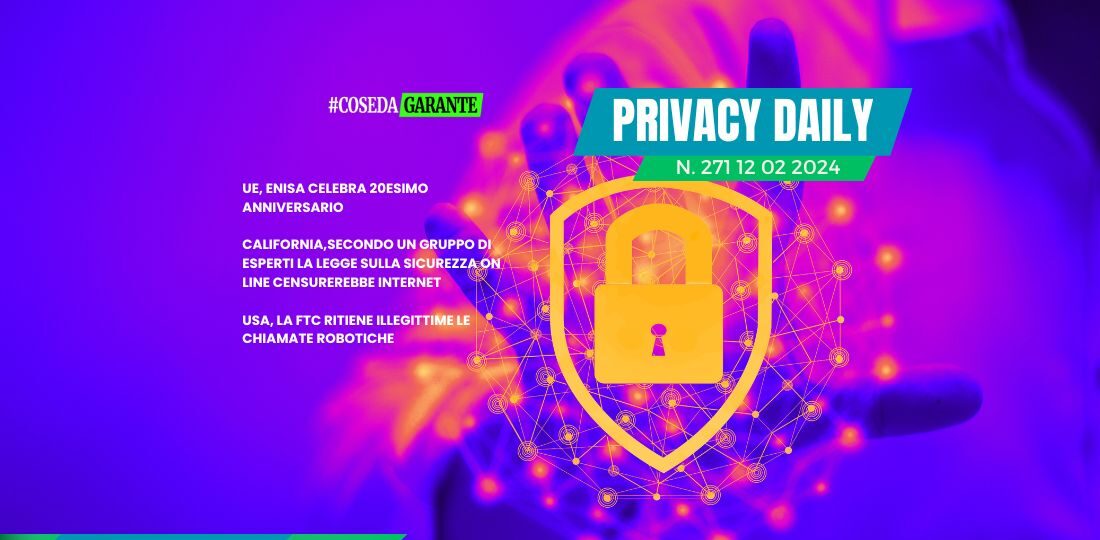VERSIONE ITALIANA
UE, ENISA CELEBRA 20ESIMO ANNIVERSARIO
L’ENISA – Agenzia dell’Unione europea per la sicurezza informatica – festeggia quest’anno il suo 20° anniversario in un momento monto complesso per il mondo legato ai dati, alla conservazione e alla loro trasmissione. Il Documento Unico di Programmazione 2024-2026 dell’ente descrive la pianificazione dell’agenzia e che sarà il punto centrale per le notifiche riguardanti la vulnerabilità e gli incidenti legati alla sicurezza dei cosiddetti “prodotti connessi”. Inoltre, l’ENISA sosterrà la mappatura delle iniziative legislative sulla cibernetica nel settore finanziario e collaborerà con altre parti interessate sull’aspetto della cibersicurezza. Nel campo dell’intelligenza artificiale invece si concentrerà sulla comprensione dell’interazione tra cybersicurezza e IA e fornirà linee guida per la sicurezza degli Stati membri in questo settore.
https://iapp.org/news/a/a-view-from-brussels-enisa-celebrates-20th-anniversary-amid-grim-times/
CALIFORNIA,SECONDO UN GRUPPO DI ESPERTI LA LEGGE SULLA SICUREZZA ON LINE CENSUREREBBE INTERNET
Secondo NetChoice la legge californiana sulla sicurezza on line -AB 2273- è un tentativo di “censurare la presenza online” ed è per questo che ha presentato una azine legale contro questa legge. L’AB 2273 impone alle aziende online che potrebbero raggiungere minori di 18 anni di dare priorità al loro “interesse” e “benessere”, vietando loro di raccogliere o condividere le informazioni personali. NetChoice sostiene che questa legge è incostituzionale poiché interferisce con la capacità degli editori web di controllare i propri contenuti editoriali. La causa di NetChoice ha ottenuto il sostegno di organizzazioni come la New York Times Company e vari gruppi giornalistici. Nel settembre scorso, un giudice ha bloccato l’applicazione della legge, ritenendo che violasse il Primo Emendamento. Il procuratore generale della California si è appellato a questa decisione, sostenendo che la legge si limita a regolare l’attività economica delle aziende nel settore dei dati dei minori.
https://www.mediapost.com/publications/article/393367/california-design-code-censors-speech-masquerade.html
USA, LA FCC RITIENE ILLEGITTIME LE CHIAMATE ROBOTICHE
La Federal Communications Commission (FCC) ha vietato l’uso nelle chiamate telefoniche di voci generate dall’intelligenza artificiale. Questa decisione è stata presa per rendere più difficile credere alle truffe vocali generate dall’IA e per contrastare l’estorsione di denaro a soggetti vulnerabili. Una coalizione di 26 procuratori generali statali ha sostenuto questa modifica. Ogni mese, gli americani ricevono oltre 4 miliardi di chiamate di questo tipo , e la FCC sta collaborando con 48 stati proprio per contrastare l’aumento di potenziali frodi. Il procuratore generale del New Hampshire ha dichiarato che sono stati rintracciati dei falsi messaggi telefonici che utilizzavano la voce del presidente Biden per scoraggiare il voto alle primarie del mese scorso e che sono stati inviati da società del Texas.
https://www.axios.com/2024/02/08/fcc-ai-robocalls-illegal
VERSIONE INGLESE
EU, ENISA CELEBRATES 20TH ANNIVERSARY
ENISA – the European Union Agency for Cyber Security – celebrates its 20th anniversary this year at a very complex time for the world of data, storage and transmission. The agency’s Single Programming Document 2024-2026 describes the agency’s planning and the fact that it will be the central point for notifications regarding vulnerabilities and security incidents of so-called ‘connected products’. In addition, ENISA will support the mapping of cybersecurity legislative initiatives in the financial sector and collaborate with other stakeholders on the aspect of cybersecurity. In the field of artificial intelligence, on the other hand, it will focus on understanding the interplay between cybersecurity and AI and provide security guidelines for Member States in this area.
https://iapp.org/news/a/a-view-from-brussels-enisa-celebrates-20th-anniversary-amid-grim-times/
CALIFORNIA, ACCORDING TO A GROUP OF EXPERTS THE ONLINE SECURITY LAW WOULD CENSOR THE INTERNET
According to NetChoice, the Californian online safety law -AB 2273- is an attempt to ‘censor online presence’, which is why it has filed a legal action against this law. AB 2273 requires online companies that could reach children under the age of 18 to prioritise their ‘interest’ and ‘well-being’, and prohibits them from collecting or sharing personal information. NetChoice claims that this law is unconstitutional because it interferes with the ability of web publishers to control their editorial content. NetChoice’s lawsuit has gained support from organisations such as the New York Times Company and various journalism groups. Last September, a judge blocked enforcement of the law, finding that it violated the First Amendment. The California Attorney General appealed this decision, arguing that the law merely regulates the economic activity of companies in the field of children’s data.
https://www.mediapost.com/publications/article/393367/california-design-code-censors-speech-masquerade.html
USA, FCC DEEMS ROBOCALLS ILLEGITIMATE
The Federal Communications Commission (FCC) has banned the use of artificial intelligence-generated voices in phone calls. This decision was made to make it harder to believe AI-generated voice scams and to counter the extortion of money from vulnerable people. A coalition of 26 state attorneys general supported this change. Every month, Americans receive over 4 billion such calls, and the FCC is working with 48 states specifically to counter the rise in potential fraud. New Hampshire’s attorney general said that fake phone messages using President Biden’s voice to discourage voting in last month’s primary were traced to companies in Texas.
https://www.axios.com/2024/02/08/fcc-ai-robocalls-illegal



